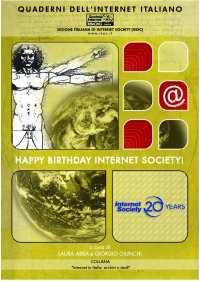- "CNUCE,
not a friendly acronym, difficult to say. In Italian there are no 'real'
words that begin with "cn". The name may be harsh, but descriptive:
national university centre for electronic calculation. .... Networks and
space were then the final frontiers: Lenzini was sent in '73 to the Cambridge
Science Centre (Massachussets) to participate in the first developments
of computer networks. ... Later, in '75 I think, Trumpy went to NASA to
learn the secrets of accurate calculation of satellite orbits, launch and
return control and also to get his hands of lots of essential programmes
to take home. We wanted to connect to that network and ... " [Gianfranco
Capriz]
- The old
Centro Nazionale Universitario di Calcolo Elettronico (C.N.U.C.E.) at the
university of Pisa had been for years known to many only for the aspects
linked to its original function as a centre supplying resources and skills
for scientific calculation.
- When CNUCE,
in November '73, became part of the state research body CNR, the question
of its name was discussed and it was decided to maintain the original name
(without the dots, which made it look a bit like U.N.C.L.E.) as the reputation
it had earned was something it could exploit and it would provide continuity
for future success.
- At that
time (early '70s) the Data Processing Division (Paolo Bronzoni) was already
involved in development of technologies for data transmission and maintained
contacts with manufacturers and telephone companies. Marco Sommani was
taken into the Division on a study grant.
- Next door,
the Major Projects Division (Luciano Lenzini) was responsible for projects
to set up a network of computers for research purposes.
- A "network"
was to be a series of independent computers, linked so that each could
access the resources available to all the others.
- The project
was carried out in collaboration with the Universities of Padova and Turin,
CNEN in Bologna, CSATA in Bari and the science centres IBM/Pisa and Cambridge
(Massachusetts). It was here that Claudio Menchi and Fausto Caneschi, who
played important roles in the evolution of network services in Italy, began
their studies, under the guidance of Lenzini; they were later joined by
Antonio Blasco Bonito, Daniele Vannozzi and Laura Abba.
- But building
communications systems would have made little progress simply by linking
computers to transmission lines, without first establishing conventions
for enabling communication (protocols). The study of communications protocols
(ISO/OSI and TCP/IP) was the field of the "Lenzini gang" research
group.
- CNUCE
was set up as a services centre, and research activities began immediately
after it became part of CNR. In many cases this was formally recognized
in the late 70s when CNUCE completed the first phase of restructuring,
achieving a structure which it has maintained since then.
- The research
groups went on to win recognition and respect in their respective sectors
at national and international level. Of these, the group led by Lenzini
certainly made its mark on the story of network research.
- "Our
intuitive feeling was to believe in the TCP/IP protocols developed by Kahn
and Cerf. Other standards and technologies proposed to connect computers
in a network, in particular OSI (Open Systems Interconnection), sponsored
by ISO, the International Organization for Standardization, did not seem
to offer the same possibilities of development and success. Luckily, we
were right." [Stefano Trumpy]
- When Trumpy
became director of CNUCE [1983] and personally worked in the sector of
research networks, playing key roles at national and international level,
there was a marked increase in CNUCE's commitment to the sector, with highly
qualified personnel attracted by the growing reputation and results achieved
by the institute: it was Stefano Trumpy again who in 1991 led CNR-CNUCE
to join the founders of the Internet Society.
- "20
years on, it is thanks to IIT (Institute of Informatics and Telematics
in Pisa) that CNR continues to support the activities of the Internet Society.
This is all within the context of the development of Internet, which involves
various aspects such as security issues, infrastructure stability and social
implications related to misuse of the Net. These activities are particularly
relevant both from a scientific point of view and also as opportunities
for the saring of ideas among experts coming from different sectors, who
find common interests and set up multidisciplinary activities. [Domenico
Laforenza]"
|
![]()
![]()
![]()
